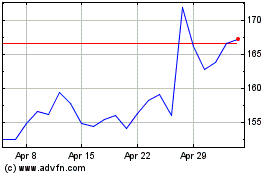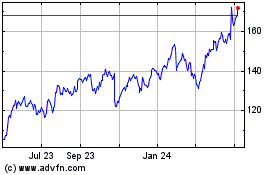Huawei Launches First Smartphone Without Google's Key Apps
September 19 2019 - 12:31PM
Dow Jones News
By Sara Germano, Dan Strumpf and Parmy Olson
MUNICH -- Huawei Technologies Co. on Thursday unveiled its first
smartphone devoid of Google's most popular apps, a byproduct of the
U.S.-China trade dispute that could complicate the Chinese tech
giant's efforts to stoke demand for its consumer products outside
China.
Since the company was added to the U.S. Commerce Department's
"entity list" in May, it has been blocked from buying U.S.-sourced
technology. This means Huawei's new Mate 30 phone series will run
on an open-source version of Google's Android operating system,
which doesn't include the Play app store and other Google apps
typically built into Huawei devices such as Google Maps and
YouTube.
The Commerce Department cited national security concerns as a
reason to place Huawei and its affiliates on the list.
"The U.S. government forced us to do this, and we have no other
solution, " said Richard Yu, Huawei's chief executive of consumer
businesses. "The U.S. ban destroyed this industry, and it's harmful
to U.S. companies' businesses, too."
While Mr. Yu said users may still be able to download Google's
apps, either through App Gallery, Huawei's proprietary app store,
or from other channels, he didn't specify which apps would be
available or where.
Mr. Yu said Huawei opted to launch the Mate 30 with the
open-source Android platform rather than its own nascent
proprietary platform, HarmonyOS, because it wants to stay in good
graces with Alphabet Inc.'s Google, which has run Android services
on earlier smartphones.
Google is among a number of U.S. companies seeking permission
from the Commerce Department to resume supplying Huawei, according
to a person familiar with the matter.
Sales for the Mate 30 device, which is priced starting at
EUR1,099 ($1,214), will be closely watched as Huawei competes for
market share in Europe, the company's most important market for
smartphones outside of China.
A Huawei spokesman said the phones will first go on sale in Asia
next month, followed by Europe, but a specific itinerary of where
the phones will be sold and when wasn't immediately available.
Changing to a new operating system is a tall order for most
smartphone users, and analysts have said Western consumers are more
likely to just switch to a different smartphone vendor if Huawei
permanently loses access to Android.
While Huawei devices are virtually unavailable in the U.S.,
sales in Europe are competitive. In 2018, Samsung Electronics Co.
took top billing on the continent with a 31% share of the market,
followed closely behind by both Apple and Huawei with 22% share
apiece, according to data from Canalys.
Although Huawei has been on the U.S. entity list for more than
four months, the reason that the Mate 30 is the company's first
phone to sell with only a stripped-down version of Android is that
Google licenses its operating system software to phone vendors on a
model-by-model basis.
Previous Huawei smartphone models before the Mate 30 received
such licenses before the entity listing took effect, according to a
person familiar with the matter.
Parmy Olson contributed to this article.
Write to Sara Germano at sara.germano@wsj.com, Dan Strumpf at
daniel.strumpf@wsj.com and Parmy Olson at parmy.olson@wsj.com
(END) Dow Jones Newswires
September 19, 2019 12:16 ET (16:16 GMT)
Copyright (c) 2019 Dow Jones & Company, Inc.
Alphabet (NASDAQ:GOOGL)
Historical Stock Chart
From Mar 2024 to Apr 2024

Alphabet (NASDAQ:GOOGL)
Historical Stock Chart
From Apr 2023 to Apr 2024
